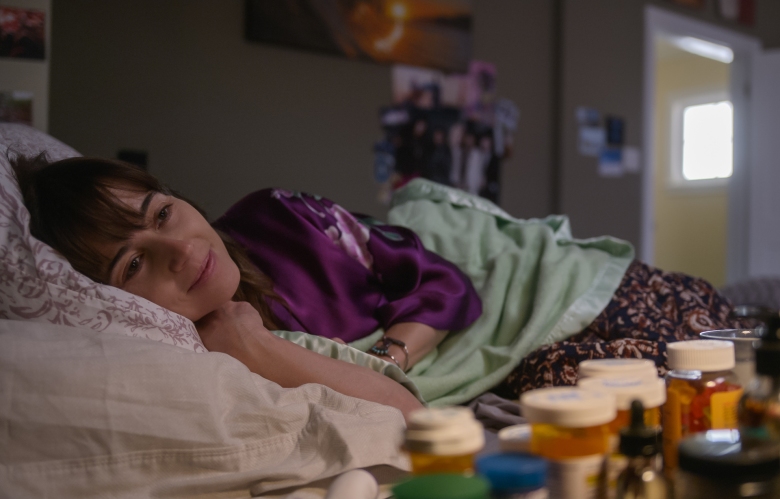“Dead to Me” has been laid to rest with its third and final season that premiered Thursday on Netflix. In the final episode, Liz Feldman’s labyrinthine dark comedy crime soap strips away the frills and thrills in favor of a good old-fashioned girls trip — a last hurrah for Jen (Christina Applegate) and Judy (Linda Cardellini), the heart and soul of the show.
Jen and Judy don’t quite make a run for it “Thelma & Louise”-style, but they use Judy’s cancer treatment clinical trial as an excuse to get away for three weeks. Before leaving, Judy confessed to being the sole party responsible for Steve’s (James Marsden) murder, but then Jen claimed to be pregnant with Steve’s baby to explain the presence of her DNA on his body. With the death of FBI agent Glenn Moranis (Garrett Dillahunt), the entire investigation is compromised/complicated, and the women take advantage of their borrowed time at Steve’s vacation home in Mexico.
“Dead to Me” flees from its tangled plot much the way that Jen and Judy flee south — and it never circles back. The FBI thinks the Greek mafia (syndicate) killed Glenn for suspecting them in Steve’s death; his twin Ben took responsibility for his DUI hit-and-run and served minimal time in prison, and and Jen’s husband’s death remains unsolved but effectively unsolvable to police. While it’s a relief to put this trouble with the law in the rearview, the ultimate dissolution of this show’s stakes also feels like a letdown.

Christina Applegate and Linda Cardellini in “Dead to Me”
Saeed Adyani/Netflix
If narrative complications seem incidental in the finale, it might be because they always were. “Dead to Me” reveled in Applegate and Cardellini’s chemistry, in having them chug wine and laugh and cry and curse about loss and insomnia and middle age. Even with all the juicy twists, this dynamic is what the writers clearly cared most for, and it takes center stage in the final episode. Gone are the day-to-day worries of what crime needs concealing, what Jen’s kids might figure out, and which Wood twin is going to show up at the door to detonate a moment’s peace. It’s just Jen and Judy and a car; Jen and Judy and a sunset, Jen and Judy and a Spanish-dubbed sitcom they can fall asleep to in each other’s arms.
It’s not Jen and Judy for long, though. Judy hid the severity of her cancer because she didn’t want Jen to worry or be upset, but she doesn’t have much time left. They share a tearful goodbye with nary a punchline, a true testament to the unlikely love that grew between them.
(There is a case to be made here — a thin one — that Judy didn’t die, that she’s relaxing in Mexico and she and Jen pretend the trial ended badly when it didn’t. We tell ourselves all kinds of stories, and if that one gives “Dead to Me” fans some comfort, so be it.)
In his review of Season 1, IndieWire’s Ben Travers noted that “the series is grounded in honest-to-goodness pain,” the finale lays that bare. This was always a show about loss — about finding the humor in it and distracting oneself and solidarity ultimately about how we grieve and remember our loved ones, even when the relationship was complicated. Judy’s death sends Jen to a familiar place, but she’s differently equipped to face it than she was when her husband died. She knows what’s coming — not just Judy’s absence, but the pain it will cause — and though that doesn’t make it easier, it offers some peace.
“Losing someone sucks,” Henry (Luke Roessler) tells Ben in Episode 2. “But it gets easier. I mean, the missing part doesn’t go away, but it stops hurting as much.”

Linda Cardellini in “Dead to Me”
Courtesy of NETFLIX
The massive, fucked-up elephant in the room all season — and last — is Jen’s role in Steve’s death. Season 2 presented it as a murder, which Season 3 amended to an accident; he drowned after she struck him on the head and knocked him into the pool. Either way, Jen bears some responsibility, and the coverup grows progressively thornier as she gets involved with Steve’s brother Ben. Telling Ben the truth isn’t out of the question, but there’s always something shunting it out of the headlines; by Ben’s rehab, by the reveal that he was in the car with Judy and Steve when they hit Jen’s husband, by Jen’s pregnancy and Judy’s cancer diagnosis. It gets buried beneath further complications until it’s so far down in the pile of priorities that Jen…forgets?
Of course not. In a somewhat inelegant but decidedly “Dead to Me” move, the show ends on a cliffhanger, with Jen about to come clean to Ben once and for all. The final scene is idyllic, easily too good to be true; they’re together, raising a baby, while Ben plays with Jen’s older boys in the same pool where his brother drowned to death. Judy’s memory stirs something in Jen, compelling her to tell the truth not to save herself or anyone else, but because it’s the right thing to do, no matter what happens next.
Is it a perfect finale? Not at all. It’s scattered, messy, and unfocused, but comes from a good place — like grief itself. It honors the heart of “Dead to Me,” which was never its tortuous storylines but the women driving them. The final shot might be frustrating, but it honors the dozens of gasp-inducing episode endings that preceded it. The series will always be a testament to the fact that life is full of genuinely insane, unbelievable twists — just maybe not all at once.
“Dead to Me” is now streaming on Netflix.
Jen and Judy don’t quite make a run for it “Thelma & Louise”-style, but they use Judy’s cancer treatment clinical trial as an excuse to get away for three weeks. Before leaving, Judy confessed to being the sole party responsible for Steve’s (James Marsden) murder, but then Jen claimed to be pregnant with Steve’s baby to explain the presence of her DNA on his body. With the death of FBI agent Glenn Moranis (Garrett Dillahunt), the entire investigation is compromised/complicated, and the women take advantage of their borrowed time at Steve’s vacation home in Mexico.
“Dead to Me” flees from its tangled plot much the way that Jen and Judy flee south — and it never circles back. The FBI thinks the Greek mafia (syndicate) killed Glenn for suspecting them in Steve’s death; his twin Ben took responsibility for his DUI hit-and-run and served minimal time in prison, and and Jen’s husband’s death remains unsolved but effectively unsolvable to police. While it’s a relief to put this trouble with the law in the rearview, the ultimate dissolution of this show’s stakes also feels like a letdown.

Christina Applegate and Linda Cardellini in “Dead to Me”
Saeed Adyani/Netflix
If narrative complications seem incidental in the finale, it might be because they always were. “Dead to Me” reveled in Applegate and Cardellini’s chemistry, in having them chug wine and laugh and cry and curse about loss and insomnia and middle age. Even with all the juicy twists, this dynamic is what the writers clearly cared most for, and it takes center stage in the final episode. Gone are the day-to-day worries of what crime needs concealing, what Jen’s kids might figure out, and which Wood twin is going to show up at the door to detonate a moment’s peace. It’s just Jen and Judy and a car; Jen and Judy and a sunset, Jen and Judy and a Spanish-dubbed sitcom they can fall asleep to in each other’s arms.
It’s not Jen and Judy for long, though. Judy hid the severity of her cancer because she didn’t want Jen to worry or be upset, but she doesn’t have much time left. They share a tearful goodbye with nary a punchline, a true testament to the unlikely love that grew between them.
(There is a case to be made here — a thin one — that Judy didn’t die, that she’s relaxing in Mexico and she and Jen pretend the trial ended badly when it didn’t. We tell ourselves all kinds of stories, and if that one gives “Dead to Me” fans some comfort, so be it.)
In his review of Season 1, IndieWire’s Ben Travers noted that “the series is grounded in honest-to-goodness pain,” the finale lays that bare. This was always a show about loss — about finding the humor in it and distracting oneself and solidarity ultimately about how we grieve and remember our loved ones, even when the relationship was complicated. Judy’s death sends Jen to a familiar place, but she’s differently equipped to face it than she was when her husband died. She knows what’s coming — not just Judy’s absence, but the pain it will cause — and though that doesn’t make it easier, it offers some peace.
“Losing someone sucks,” Henry (Luke Roessler) tells Ben in Episode 2. “But it gets easier. I mean, the missing part doesn’t go away, but it stops hurting as much.”

Linda Cardellini in “Dead to Me”
Courtesy of NETFLIX
The massive, fucked-up elephant in the room all season — and last — is Jen’s role in Steve’s death. Season 2 presented it as a murder, which Season 3 amended to an accident; he drowned after she struck him on the head and knocked him into the pool. Either way, Jen bears some responsibility, and the coverup grows progressively thornier as she gets involved with Steve’s brother Ben. Telling Ben the truth isn’t out of the question, but there’s always something shunting it out of the headlines; by Ben’s rehab, by the reveal that he was in the car with Judy and Steve when they hit Jen’s husband, by Jen’s pregnancy and Judy’s cancer diagnosis. It gets buried beneath further complications until it’s so far down in the pile of priorities that Jen…forgets?
Of course not. In a somewhat inelegant but decidedly “Dead to Me” move, the show ends on a cliffhanger, with Jen about to come clean to Ben once and for all. The final scene is idyllic, easily too good to be true; they’re together, raising a baby, while Ben plays with Jen’s older boys in the same pool where his brother drowned to death. Judy’s memory stirs something in Jen, compelling her to tell the truth not to save herself or anyone else, but because it’s the right thing to do, no matter what happens next.
Is it a perfect finale? Not at all. It’s scattered, messy, and unfocused, but comes from a good place — like grief itself. It honors the heart of “Dead to Me,” which was never its tortuous storylines but the women driving them. The final shot might be frustrating, but it honors the dozens of gasp-inducing episode endings that preceded it. The series will always be a testament to the fact that life is full of genuinely insane, unbelievable twists — just maybe not all at once.
“Dead to Me” is now streaming on Netflix.


